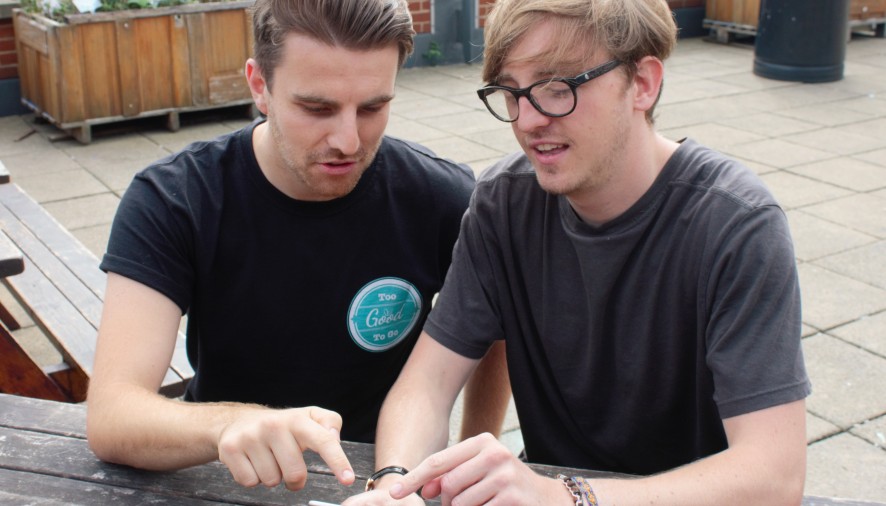The Gryphon speaks to Leeds grads Chris Wilson and Jamie Crummie about their quest to tackle the country’s food waste problem through their new app, Too Good to Go, that allows you to buy restaurants’ food at a fraction of the normal price.
Over one million people in the UK have received emergency food parcels in the last year. Meanwhile, over a third of all food that is produced across the world ends up in landfill. These are two problems that, according to Jamie Crummie, should not co-exist.
Crummie, alongside fellow Leeds grad Chris Wilson, both 25, have created the potentially revolutionary new app Too Good To Go as a way of combating both increasing poverty across the country, and the environmental damage caused by food waste.
The app allows users to buy up the left-over food at local restaurants up to the price of £3, whether it’s a sandwich from a nearby deli or the leftovers from a local world buffet. It’s a no brainer really – you can get a full meal for half the price you would normally pay and help save the planet at the same time.
Wilson was involved with the Too Good to Go project in Denmark last year, and brought the concept over to the UK in January. Since then, the app has been established in Leeds, London, Brighton and (shortly) Manchester with over 40,000 users and around 170 restaurants on board. Over 2000 meals have been saved from landfill, preventing 4000 kilos of CO2 from being released in to the atmosphere.
It’s impressive stuff, showing what can happen when you unite the British passion for a good bargain with an environmental consciousness.
Crummie is convinced of the app’s popularity and ability to bring about change: “The users are now far outnumbering the restaurants which I think is quite telling
“There’s 40,000 people who think food waste is wrong, there’s 40,000 people who want to join this food waste movement and now we need to demonstrate that to restaurants and to lobby groups who can campaign for legislative change”
I had to give the app a go for myself to see exactly how it worked. Waking up on Monday morning I decided to have a browse to see my options for a tasty discount lunch. Although the selection of restaurants on the app is still quite small, Leeds favourites such as The Greasy Pig, Oranaise cafe, Peachy Keens buffet and Popina’s all feature.
I booked myself in for a tasty meal for £2.50 from Wolf Street food to collect just before 3pm when the shop closes. The fact that I was able to book a ‘left over’ meal for myself at 8.30am, over 6 hours before I was due to collect it, did make me doubt the legitimacy of the claim that the app is solely for food that is heading for the bin. How would they know this food would be left over so early in the day?
Trying to reassure me, Crummie explained that “the price range for all our restaurants is between £2 and £3.80, and we keep the prices small to ensure the restaurants aren’t simply selling more food. These small margins ensure it can’t be used as a profit-gaining machine.”
I headed down to the deli at my allocated pick up time and was given a delicious pasta meal with spicy chicken and tomato sauce, peppers, red onion and sweetcorn. It was a huge portion, and for £2.50 an absolute bargain.
There are some practical difficulties which might make the app difficult to incorporate into everyday life. You get given an allocated time frame to pick your food up, normally just before the shop closes, so around 3pm for lunchtime eateries, and around 10pm for dinner time restaurants – not exactly peak meal times. And although this might be stating the obvious, it’s not an app for picky eaters as you don’t get much of a choice.
The positives far outweigh the negatives though. Fresh hot food cooked at student friendly prices that enable you try out new things and find some hidden gems of Leeds, all while helping to save the planet.
The app has received some criticism for commercialising the leftover food, and diverting it to well off consumers rather than the poor and homeless who could benefit from it most.
Crummie responded: “By releasing the app and making it available to the public, our primary goal, more so than being a service which allows somebody to pick up food at a cheaper price, is to educate and inform people about food waste.”
Jamie also went on: “From the research we’ve done and the people we’ve spoken to who volunteer in foodbanks, it’s not really a stereotypical type of person who’s using a food bank, they range from all walks of life.
“They could be single parents who’ve recently divorced and are finding it tough, or they could be recently unemployed or been made redundant, and these are often people who have access to mobile phones and a debit card”
“It’s about social inclusion and removing the stigma that’s attached to charity”
The app has snowballed in popularity and media coverage in recent weeks, and the pair have big plans for the future. They hope to be established in ten UK cities by the end of the year, to get more big chain restaurants on board (the biggest food waste culprits) and to start delivering meals to after school clubs and nursing homes.
The app may only go a small way towards tackling the food waste and food poverty epidemic in the UK, but as Crummie says, they’re feeding bellies and not bins, and that can only be a good thing.
Jessica Murray



